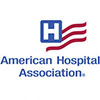 (June 13, 2025) – Late last week, I had the opportunity to join several Kansas hospital leaders and participate in the American Hospital Association's Regional Policy Board meeting for AHA Region 6. AHA Region 6 includes Kansas, Missouri, Nebraska, Iowa, South Dakota, North Dakota and Minnesota. The meeting consisted of several timely issues. The AHA staff always does a great job developing and facilitating the meeting.
(June 13, 2025) – Late last week, I had the opportunity to join several Kansas hospital leaders and participate in the American Hospital Association's Regional Policy Board meeting for AHA Region 6. AHA Region 6 includes Kansas, Missouri, Nebraska, Iowa, South Dakota, North Dakota and Minnesota. The meeting consisted of several timely issues. The AHA staff always does a great job developing and facilitating the meeting.
The RPB meeting started with an update on the latest happenings in Washington, DC surrounding the budget reconciliation bill. Rick Pollack, AHA president and CEO, and Stacey Hughes, AHA executive vice president, provided an up-to-the-minute recap on the recent political activities, including offering insights on what to expect over the next several weeks. The Medicaid policies being considered in the "One Big Beautiful Bill Act" are estimated by the Congressional Budget Office to save more than $800 billion over the next ten years. Policies that may have the most drastic impact on Kansas hospitals include limits on provider taxes and state-directed payments. It is speculated that freezing the provider taxes and state-directed payments at their current rate would create an estimated 10-year national savings of $89.3 billion and $72 billion, respectively. Recognizing the urgency and importance of the policy discussions being considered by the U.S. Senate, AHA has organized an advocacy fly-in for next week. KHA staff plan to be in DC next week to meet with several Kansas delegation offices to communicate the impact of potential Medicaid policy changes. Stay tuned ... we will share the updates from these meetings.
As part of the RPB meeting, a portion of the agenda was dedicated to gathering feedback on price transparency and guaranteed pricing models. To date, most transparency efforts on the national and state levels are focused on the disclosure of health care prices in various formats. Publishing the chargemaster and "shoppable services" are just a couple of the requirements for hospitals. Transparency requirements continue to evolve as further policies have been released that hospitals must follow. The RPB members engaged in an in-depth discussion on proposals that 1) guaranteed prices for self-pay and uninsured patients; 2) guaranteed prices for insured patients' cost-sharing amounts; and 3) guaranteed prices for all payers. For the most part, most hospitals are not currently offering guaranteed prices. Several RPB members have raised questions related to how this will be implemented. Much of the discussion focused on third-party tools and resources hospitals use to estimate patient pricing.
The other significant topic discussed revolved around the Make America Healthy Again initiative to combat chronic disease and improve childhood health. Last month, the MAHA Commission released four key drivers of childhood chronic disease that included poor diets comprised of ultra-processed foods, exposure to environmental chemicals, lack of physical activity and overmedication via overprescribing. A discussion ensued among the RPB members identifying and sharing best practices by hospitals to combat chronic disease. Several innovative approaches were shared, focusing on wellness and preventative practices.
Kansas hospitals were well-represented at this recent RPB meeting by Carrie Lutz, Holton Community Hospital, Holton; David McCorkle, Citizens Health, Colby; and Alan Verrill, MD, AdventHealth Shawnee Mission, Shawnee Mission. Thanks to these hospital leaders for participating and sharing their insightful perspectives!
--Chad Austin